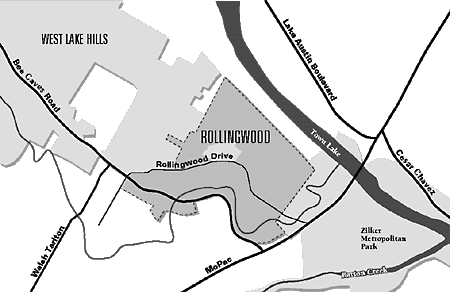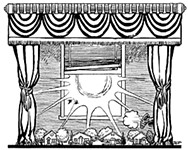A Sovereign Neighborhood
Happy Days
By Mike Clark-Madison, Fri., Jan. 22, 1999
In that year, the Hatley brothers, A.B. and George, bought the north half -- the portion between the river and the two-lane, barely paved Bee Cave Road -- of the sizeable Dellana Ranch. After parceling out chunks of this tract to various friends and relations, the Hatleys began building out the subdivisions that make up today's Rollingwood. Much of the community's development thereafter followed what, today, would be called an "infill" model, with small parcels changing hands and, sometimes, cities, and many older houses being torn down to make way for the grand manses we now associate with the Westbank. Today, the median home value in Rollingwood is nearly double that of Austin. Ultimately, the decisions that shaped -- and are still shaping -- today's Rollingwood had to do not with land use but with infrastructure. When the Hatleys first got to work, the Westbank was pretty primitive when it came to public services. Rollingwood was the site of several unregulated open-pit garbage dumps, including one of the city of Austin's own sanitary landfills; not until 1960 did Rollingwood residents get garbage pickup. The first police chief was paid $30 and given a whistle; several years passed before he got a siren, several more before Rollingwood got a proper police car. The fire truck, when they finally got one, was stationed for a decade at Rollingwood's one gas station -- which was also where the garbage collector had his office. Not until 1967 did the city implement a street-paving program. And so on.
Pipeline to Problems
Most importantly, Rollingwood had no public water or sewer service, and in the latter case still doesn't, as city utility-watchers are numbingly aware. Back in the day, Rollingwood's private water supply was notoriously bad, rusty brown and odorous with no pressure, carried through Army-surplus pipes laying directly atop the ground. Not until 1969 did Rollingwood begin getting city of Austin water service; it probably would have come in earlier if not for the bitter blood feud between George Hatley and longtime Austin mayor Tom Miller, who announced in the 1950s that "When I get through, Rollingwood will be deadwood!" For many years thereafter, Rollingwood fought the "suburban penalty" embedded in Austin's water-rate structure, at one point hauling the bigger city into court, before the Texas Water Commission, and into an Austin-bashing episode in the Texas Legislature.
Ironically, perhaps, a private water supplier, Thom Farrell, is the current mayor of Rollingwood, and one of his main orders of business today is getting Rollingwood hooked up to the city's sewer lines. At its meeting Jan. 14, the Austin City Council authorized staff to negotiate and execute an agreement for wastewater service to Rollingwood, the latest chapter in a saga shaped by the strained relationships, particularly on matters environmental, between Austin and the Westbank. The deal envisioned by Rollingwood would involve both the city and the Lower Colorado River Authority, and would be voluntary to Rollingwood residents, though city officials expect "probably 80%" of Rollingwood households would hook up.
"It hasn't always been true that Rollingwood gets along with Austin," says Farrell, "and changing that's been one of my goals. We're a neighbor to Austin, and to West Lake Hills, and to Travis County, and to the LCRA, and I would never go argue with my real next-door neighbors over trivial matters. And I try to treat those other jurisdictions the same way I'd treat my neighbors." Farrell adds that, as far as city-limit lines go, they are his personal next-door neighbors: "West Lake and Rollingwood and Austin all come together in my backyard." This is not uncommon in Rollingwood; one block on the town's western edge contains properties that lie in all three cities as well as in the unincorporated county.
Ryan Kelley, Rollingwood's city administrator, feels that the long-running controversy over sewer service reflects Greater Austin's misunderstandings about Rollingwood. "We often feel targeted by an animus that really has more to do with West Lake Hills and the suburbs further out," says Kelley. "And Austin environmentalists wanted us to go without sewer service, or to build our own wastewater treatment plant, as penance for people being out here." Ultimately, the fact that Rollingwood has fewer than 50 acres of undeveloped land helped alleviate fears that sewerage would promote sprawl in sensitive areas; such fears are still very real, though, for West Lake Hills, which is still seeking wastewater service from either Austin or the LCRA.
In its view, Rollingwood is a lot more like Barton Hills -- on the white-and-wealthy side, to be sure, but nonetheless pretty committed to the full slate of Austin progressive goals -- than it is like West Lake Hills. In Kelley's words, "We're not anti-Austin and we're not anti-environment." Or, as Farrell puts it, "I want Austin to be a healthy, environmentally safe, and economically viable city, because we have so many issues in common that we should work together. We're certainly committed to work with every neighbor that we have to ensure that quality of life is protected and that everyone's rights are protected."
"Rights" can be a scary word, of course, when talking about growth, development, and regulation in Texas. But nowhere in Greater Austin is the need for regional dialogue and problem-solving better illustrated than on the Westbank, with its multiple jurisdictions sharing a common urban destiny, both good and ill. And no issue on the Westbank highlights this more than Rollingwood's other civic Excedrin headache, the horror story that is Bee Caves Road.
The Killer Bee
In the great urban-suburban schism, Bee Caves Road puts Rollingwood on the side of the angels. "Right now, Rollingwood is more negatively affected by the growth on Bee Caves," says Farrell. "We get a little sales tax, but not much, and with everything that happens to the west, I get the traffic and not the tax revenue."
In case you slept through the last few years, a lot has happened to the west: active commercial strips all along Bee Caves through West Lake Hills, out to the vast Village at Westlake shopping complex at Loop 360, and beyond, past the Barton Creek Country Club, to the road's terminus at Highway 71 in the formerly invisible Village of Bee Cave. Both Bee Cave and West Lake Hills reap astounding amounts of sales tax for cities so small. Meanwhile, both Kelley and his predecessor had to nudge the state comptroller to recover meager tax collections from businesses with "Austin" addresses. (There is, of course, no "Rollingwood" or "West Lake Hills" ZIP code.)

Which means Rollingwood is providing a home for weekly wrecks and daily traffic jams as a public service to its neighbors farther west, and is now dependent on the kindness of the Texas Department of Transportation to fix the mess. Right now, the conflict is between putting in a median (which would make the road slower, though safer), and putting in a continuous left-turn lane (which would make the road faster, though "chicken lanes" are notoriously accident-prone). To the surprise of almost no one, Austin transportation activists prefer the former option and TxDOT the latter; Rollingwood residents are divided on what has become Topic A in town, though the Rollingwood City Council has moved to endorse the TxDOT plan "because we don't have the funds to purchase right of way for a wider road with a median," Kelley says.
Kelley notes that "people in Rollingwood got really mad at each other" over the Bee Caves Road plans, a situation exacerbated by "activists who came in from outside the city (who) brought out a lot of anger." Not that Rollingwood city leaders don't care what their out-of-city neighbors think. "One of my tasks for 1999 is to bring in the neighborhood groups from around Zilker Park and from farther out along Bee Caves Road, as well as the folks in Rollingwood," Farrell says. "All of us have an ultimate interest in how that road's designed."
While Rollingwood isn't a very demographically diverse community, there's plenty of diversity of opinion on civic issues. Voter turnout is high, and city councils can and do get turned out on their collective rumps. And day-to-day city business is affected at all levels by the power of direct democracy and citizen participation; residents drop by City Hall (yes, there is a Rollingwood City Hall) as they please to talk issues with whomever's around, which is usually Kelley. "People are used to having a city manager who answers the City Hall phone," he says.
This hands-on government eliminates much of the role played in Austin by neighborhood leaders and their associations, he says. "Instead of having to go to boards and commissions, and having outside agents control the public agenda, the citizens here form informal coalitions among themselves that are constantly changing, depending on the issue."
Rollingwood does have a neighborhood association which covers the entire city and all of its residents (though not its businesses), and its leaders echo Kelley's assessment. "Individual citizens can lobby City Council themselves, so we don't need to," says Rollingwood NA president Ken Fincher. "We serve as a forum for issues affecting quality of life in Rollingwood ... but we've intentionally remained more social than political. On some of the hot-button issues the city has been divided, and we've sidestepped getting into the middle of most of those frays."
What it does instead is sponsor Easter egg hunts and summer barbecues, neighborhood-watch programs and beautification campaigns. This may seem like purely soft stuff until you remember that in other cities the taxpayers foot the bill for them. "There's a lot of scrutiny of the city budget, and a lot of neighbors are concerned about keeping taxes low while still getting good services," says former NA president Steve Guengerich. "So we don't say, 'Oh, let's let the city do it and we'll just pay a higher tax rate.' We go to the nursery and buy our own plants for the city park and plant them ourselves."
This involvement is much appreciated by the often cash-strapped city government. "When Rollingwood bought our park, it cost 50% of the annual city budget," Farrell notes. "All of the improvements since have been done through the donations and volunteer labor of our citizens. You have to be able to take advantage of that when you're trying to get things done as a small city, and one of the best parts of my job is bringing these people together."
They come together easily, in part, because Rollingwood's small-city status, while a potential handicap when dealing with macro-level issues like major highways and regional wastewater systems, is a boon for customers of bread-and-butter services. "We can't provide the same array of services, but we can provide a better quality of service," Kelley says, noting that Rollingwood still has twice-a-week garbage pickup and that the city has five police officers serving a populace that in Austin would be lucky to have two.
This is more than idle city bragging, for as Rollingwood changes, in Farrell's words, "the new citizens may be looking for a different level of service." The old-time, and often just plain old, Rollingwood residents (20% of householders are over 65) are being replaced by younger families moving from elsewhere in Central Austin -- or into Central Austin from boroughs farther out. It has largely been these folks, accustomed to more robust services than Rollingwood has traditionally offered, who've been involved with supplementing them through the NA; settlers to come may prefer that the city provide more services itself.
However, the newcomers also like Rollingwood's low (but not as low as West Lake) property tax rate, especially since they're soaked by Eanes ISD on school taxes, and any city council that aims to raise taxes -- or to promote heavy commercial development where possible on Bee Caves Road to boost sales tax collections -- does so at its peril. "We're too wealthy, per capita, to get grants to pay for new or innovative services," says Kelley. "And Austin tells us, and West Lake tells us, that we need to tax our own people for them. But no council can do that, because not only will they be thrown out of office -- which shouldn't matter to them if they're statesmen -- but they'll be thrown out of their neighborhood."
Got something to say on the subject? Send a letter to the editor.







